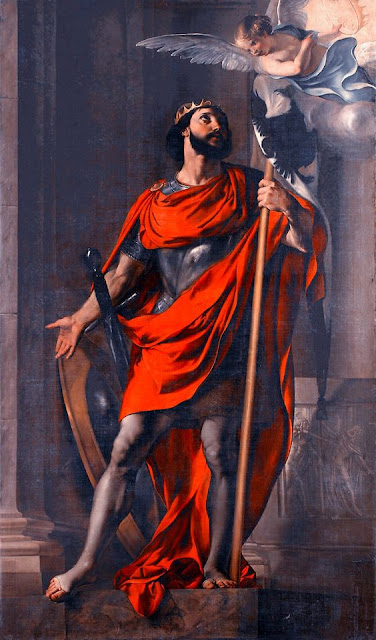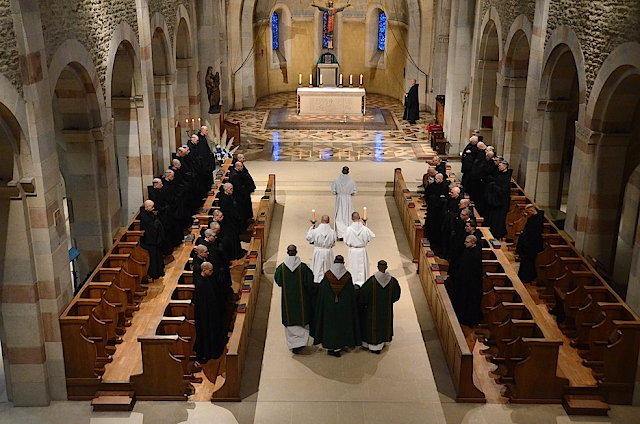Catholic devotions for the 28th September
Scroll down for today's
Saint of the DayReading of the Martyrology
Dedication of the Month
Dedication of the Day
Rosary
Five Wounds Rosary in Latin
Seven Sorrows Rosary in English
Latin Monastic Office
Reading of the Rule of Saint Benedict
Celebration of Mass
Reading from the School of Jesus Crucified
Feast of Saint Wenceslaus
Saint Wenceslaus (properly Václav, Duke of Bohemia) is the patron saint of the Czech people and Czech Republic. His feast day is September 28, the date of his murder in the town of Stara Boleslav by his brother Boleslav, a pagan, who sought to supplant him as ruler with the title of "Prince of Bohemia" (by this title he indicated his independence from the Church). Wenceslaus was subsequently canonized on the basis of his saintly life, together with miracles that were attributed to him.
Since 2000, the Saint's feast day has been a public holiday in the Czech Republic, celebrated as Czech Statehood Day. He is venerated as "the cornerstone of our existence as State and Nation." In his comments during the celebration of the Saint's feast day on September 28, 2007, Apostolic Nuncio Diego Causero stated:
“Good King Wenceslaus” was able to incarnate his Christianity in a world filled with political unrest. He stood for Christian values and died for them. He has a call for all Christians and men of good will of this Country: to become involved in positive social change and political activity, no matter how much it costs, in order to bring harmony and justice to society.
THE LEGEND OF S. WENCESLAUS.
The holy Christmas-tide was drawing nigh. The Church was already far advanced in Advent; and was now bidding her children to look forward to the coming King. Winter had set in over Germany with unusual severity; hedges, fields, and ways, were blotted out in the deep soft snow; the creaking of the rude waggons was silent; the labourer was idle; the plough was in the shed; the spade and mattock in the tool-house.
King Wenceslaus of Bohemia sat in his palace. He had been watching, from the narrow window of the turret-chamber where he was, the sunset, as its glory hung for a moment on the western clouds, and then died away over the Erzgebirge, and the blue hills of Rabenstein. Calm and cold was its brightness; the colours that but now were of ruby and jasper, faded into purple, and were lost in grey; a freezing haze came over the face of the earth; the short winter day was swallowed up of night. But the crescent moon brightened towards the south-west; and the leafless trees in the castle gardens, and the quaint turrets and spires of the castle itself, threw clear dark shadows on the unspotted snow.
Still the King gazed forth on the scene, for he had learnt to draw lessons of wisdom from all these daily changes that we so little regard; and he knew that God speaks to us by this beautiful world; he was able, in a very true sense, thus to make the nights and days, the summer and winter, to bless the Lord, and to praise Him and magnify Him for ever. And so, in that sunset, he saw an emblem of our resurrection; he felt that the night would come, the night in which no man could work; but he knew also that the morning would follow, that morning which shall have no evening.
The ground sloped down from the castle towards the forest. Here and there on the side of the hill, a few bushes, gray with moss, broke the unvaried sheet of white. And as the King turned his eyes in that direction, a poor man—and the moonshine was bright enough to show his misery and his rags— came up to these bushes, and seemed to pull somewhat from them.
"Without there !" cried King Wenceslaus. "Who is in waiting !" and one of the servants of the palace entered, and answered to the call.
"This way, good Otto," said the King. " You see that poor man on the hill-side. Step down to him and learn who he is, and where he dwells, and what he is doing; and bring me word again."
Otto went forth on his errand, and the King watched him down the hill. Meantime the frost grew more and more intense ; the east wind breathed from the bleak mountains of Gallicia; the snow became more crisp, and the air more clear. Ten minutes sufficed to bring back the messenger.
"Well, and who is it?" inquired King Wenceslaus.
"My liege," said Otto, "it is Rudolph the swineherd, he that lives down by the Brunweiss. Fire he has none, nor food neither: and he was gathering a few sticks where he might find them, lest, as he says, all his family perish with cold. It is a most bitter night, Sire."
"This should have been better looked to," said the King; "and a grievous fault is it that it has not been. But it shall be amended now. Go to the ewery, Otto, and fetch some provisions, of the best; and then come forth, and meet me at the wood-stacks by S. Mary's Chapel."
"Is your Majesty going forth?" asked Otto.
"To the Brunweiss," said the King; "and you shall go with me; wherefore be speedy."
"I pray you, Sire, do not go yourself. Let some of the men-at-arms go forth. It is a freezing wind; and a league it is at least to the place."
"Nevertheless," said Wenceslaus, " I go. Go with me, if you will; if not, stay; I can carry the food myself."
" God forbid, Sire, that I should let you go alone. But I pray you to be persuaded."
" Not in this," said Wenceslaus. " Meet me, then, where I said; and not a word to anyone besides."
The noblemen of the court were in the hall, where a mighty fire went roaring up the chimney, and the shadows played and danced on the steep sides of the dark roof. Gaily they laughed, and lightly they talked, and they bade fresh logs be thrown into the chimney-place; and one said to another, that sp bitter a winter had never been known in Bohemia.
But in the midst of that freezing night, the King of Bohemia went forth. He had put on nothing to shelter himself from the nipping air; for he desired to feel with the poor, that he might feel for them. On his shoulder he bore a heap of logs for the swineherd's fire; and stepped briskly on, while Otto followed with the provisions. He, too, had imitated his master, and went in his common garments; and over the crisp snow, across fields, by lanes where the hedgetrees were heavy with their white load, past the frozen pool, through the little copse, where the wind made sweet melody in summer with the leaves, and rivers of gold streamed in upon the ground, but now silent and ghastly — over the stile where the rime clustered thick, by the road with its ruts of mire, and so out upon the moor, where the snow lay yet more unbroken, and the wind seemed to nip the very heart.
Still the King went on first: still the servant followed. The Saint thought it but little to go forth into the frost and the darkness, remembering Him Who came into the cold night of this world of ours; he disdained not, a King, to go to the beggar, for the King of Kings had visited slaves; he grudged not to carry the logs on his shoulder, for the LORD of all things had carried the Cross for his sake. But the servant, though he long held out with a good heart, at each step lost courage and zeal. Then very shame came to his aid; he would not do less than his master; he could not return to the court, while the King held on his way alone. But when they came forth on the white, bleak moor, his courage failed.
"My liege," he said, "I cannot go on. The wind freezes my very blood. Pray you, let us return."
"Seems it so much?" asked the King. "Was not His journey from Heaven a wearier and a colder way than this ?"
Otto answered not.
"Follow me on still," said S. Wenceslaus. "Only tread in my footsteps, and you will proceed more easily."
The servant knew that his master spoke not at random. He carefully looked for the footsteps of the King: he set his own feet in the print of his lord's feet.
And so great was the virtue of this Saint of the Most High, such was the fire of love that was kindled in him, that, as he trod in those steps, Otto gained life and heat. He felt not the wind; he heeded not the frost; the footprints glowed as with a holy fire, and zealously he followed the King on his errand of mercy.
The Reading from the Martyrology
Thursday is the Day dedicated to the Blessed Sacrament
On Thursdays, many Catholics make "Holy Hour," that is, they spend an hour in adoration of the Blessed Sacrament as an aspect of devotion to the Sacred Heart. On the fifteen consecutive Thursdays before the May 22, many Catholics make the "Fifteen Thursdays of St. Rita" devotion.
The Joyful Mysteries of the Rosary are prayed on Thursday
The Rosary in Latin
Chaplet of the Five Holy Wounds of Christ in Latin
Chaplet of the Seven Sorrows of Our Lady in English
Latin Monastic Office for today from Le Barroux in France Texts also provided
19 Voluntatem vero propriam ita facere prohibemur cum dicit Scriptura nobis: Et a voluntatibus tuis avertere.
20 Et item rogamus Deum in oratione, ut fiat illius voluntas in nobis.
21 Docemur ergo merito nostram non facere voluntatem cum cavemus illud quod dicit sancta scriptura: Sunt viae quae videntur ab hominibus rectae, quarum finis usque ad profundum inferni demergit;
22 et cum item pavemus illud quod de negligentibus dictum est: Corrupti sunt et abominabiles facti sunt in voluptatibus suis.
23 In desideriis vero carnis ita nobis Deum credamus semper esse praesentem, cum dicit propheta Domino: Ante te est omne desiderium meum.
Chapter 7 Humility
19 For it is truly our own will that we are forbidden to do as Scripture tells us: and turn away from your own will (Sir 18:30).
20 And so too we request of God in the Prayer that His will may be done in us.
21 Thus we are rightly taught not to do our will, being warned as Sacred Scripture says that there are ways which appear right to men, but which at their end plunge into the depths of hell (Prov 16:25);
22 or again, when we shudder at what is said of the negligent: They are corrupt and have become abominable in their pleasures (Ps 14:1).
23 Truly, as regards the desires of the flesh we believe that God is always present to us, as the prophet says to the Lord: Before you is all my desire (Ps 38:10).
Today's Celebration of the Mass
Jesus XPI Passio sit semper in cordibus nostris
May the Passion of Jesus Christ be always in our hearts













.jpeg)

Comments